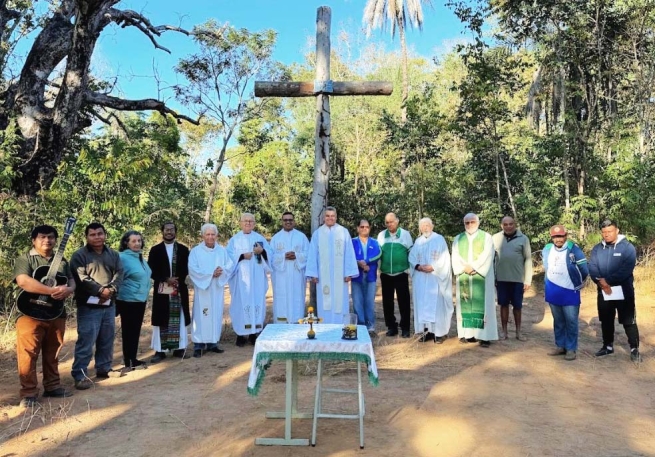In addition to the Salesians, the indigenous people of the Boe-Bororo and Xavante ethnic groups also participated in the celebration, representing the original populations of Mato Grosso served by the Salesians.
In the early morning a commemorative Eucharist was celebrated by Fr João Bosco Monteiro Maciel. Using the book written by the late Fr Giuseppe Corazza, he also briefly described the history of the place, citing the names of some of the first Salesian pioneers who founded the Don Bosco mission in Mato Grosso.
The entire assembly gathered there raised a prayer for all those who, during these 130 years, have given their lives for the cause of evangelisation, both Salesians and lay people, and for all the collaborators who have supported the Mission entrusted by St John Bosco to his children.
After Mass, the group went to the ancient cemetery of Tachos, where the founders of the mission are buried: Salesians Bro. Pedro Bertolino (died 25 March 1905), Bro. Antonio Baldi (died 19 October 1911), Fr Giuseppe Pessina (died 19 April 1916), Bro. Domenico Montanari (died 1 August 1921), Fr Manuel da Fonseca (died 28 April 1924) and the indigenous leader of the Boe-Bororo, Uke Wagúu.
Everyone said a Hail Mary together on their behalf, a sign of gratitude for the sweat and blood shed in the mission lands.
Today, the BCG Salesian Province, also known locally as the Salesian Mission of Mato Grosso, operates in 21 Salesian presences in the central-western region of Brazil, involving 122 Salesians from Don Bosco and countless lay people from the Salesian Family. Their work is focused on educational institutions of various kinds in parishes, social works and indigenous missions.
The Salesians arrived in the central-western region of Brazil on 18 June 1894, when Bishop Luigi Lasagna and five missionaries landed in Cuiabá. They began their activities in the parish of São Gonçalo do Porto and founded the São Gonçalo institute in Cuiabá, in the same year. After the sudden death of Bishop Lasagna, in 1895, he was succeeded by Fr Antonio Malan, who became the first Provincial of the Salesian Mission in Mato Grosso.
The Salesians then founded their institutes in Cuiabá and Corumbá, agricultural schools and missions among the Bororo indigenous people. From 1895, with the arrival of the Daughters of Mary Help of Christians, the Salesians expanded their service among the Bororo.
Over the years, the Salesian Mission has faced many challenges, such as the loss of four Salesians in missionary activities. In 1994, the Salesian Province celebrated its centenary and inaugurated the "House of Dreams" in Chapada dos Guimarães.
The Salesian Social Works of the Province are a place that welcomes and transforms the lives of children and young people in situations of vulnerability. In each of them the Sons of Don Bosco offer quality education, social assistance, human and professional training, and try to help these young people build a dignified future.
Today the Salesian presence in Mato Grosso remains strong, with schools and universities in Cuiabá, Cáceres, Campo Grande, Corumbá, Três Lagoas, Lins and Araçatuba. The mission remains focused on the evangelisation and education of young people, with an expanding Salesian youth movement.
The Salesian Family is active in carrying forward and spreading the mission of St John Bosco for the most needy young people, and continues to generate vocations to religious, Salesian and priestly life, with a new generation of Salesians formed by the vocational work carried out in the region.
For 130 years, the Salesians have dedicated their missionary zeal to the central-western region of Brazil, evangelising and educating young people. Their presence in schools and communities has left a lasting legacy that continues to transform lives and shape the future of the region.
The history of the Salesians in the central-western region is a history of faith, education and commitment for young people.
Euclid Fernandes


